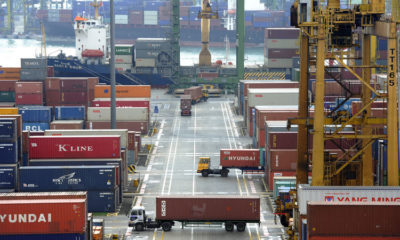Economy
Coronation Trade Insights
Published
3 years agoon

Nigeria in focus
The latest report from the National Bureau of Statistics (NBS) in its series on foreign trade in goods shows the total value of trade increased by 11.8% q/q to N11.7trn in Q4 ‘21. For FY ’21, total foreign trade increased by 57.6%, to N39.7trn from N25.2trn in 2020. Compared with 2020, the total export value rose by 51% to N18.9trn, from N12.5trn and the import value rose by 64.1% to N20.8trn from N12.7trn. The net result was a deficit of N1.9trn, which followed a deficit of N178bn the previous year.
Total trade in 2021 was higher primarily due to subsiding pandemic restrictions that had affected export activity in 2020 and increases in commodity prices (i.e. crude oil). The total trade as a percentage of nominal GDP stood at 22.6% in 2021, compared with 16.4% in 2020.
For Nigeria, the NBS notes that most imports in Q4 and FY ’21 originated from Asia (China in particular). In 2021, the value of imported agricultural goods, manufactured products as well as oil-related products rose by 57%, 2.5% and 43.3% respectively when compared to FY ‘20.
Regarding export destination, India remained the top exporting partner for Nigeria in 2021. The five top exports partners were India, (16.4%) Spain (11.8%), France (6.3%), the Netherlands (6.0%) and Canada (4.5%). These five countries accounted for 45% of the total exports in 2021.
Unsurprisingly, crude oil accounted for the largest share (76.2%) of total exports in 2021. The value of crude oil exports increased by 52.6% when compared to 2020. Bonny Light averaged USD71.1/b in 2021. We note that raw and fermented cocoa beans, sesamum seeds, ginger, cigarettes, natural rubber and aluminium featured as
non-oil export products in 2021.
Nigeria exported goods valued at N1.2trn to fellow members of the Economic Community of West African States (ECOWAS), compared with N841bn in 2020. This represented 51.4% of total exports within Africa. Meanwhile, imports from ECOWAS accounted for 15% of the value of total imports.
The leading port of operation during the year under review was the Apapa Port. Goods worth N17.1trn exited the country through this port. The next leading port of operation was Port Harcourt, through which goods worth N1trn were shipped to partner countries. Tin Can Island was also very active and goods worth N405bn exited Nigeria through this port.
The CBN announced the RT200 FX program, which is a set of policies, plans and programs for non-oil exports that will enable the country to attain the goal of USD200bn in FX repatriation from non-oil exports over the next 3-5 years. The program would rest on five key anchors; (I) non-oil exports proceed repatriation rebate scheme (II) Non-oil commodities expansion facility (III) Dedicated non-oil export terminal (IV) Value-adding exports facility (V) Biannual non-oil exports summit.
The CBN has released the operating guidelines for the non-oil export proceeds repatriation rebate scheme. Under this scheme, non-oil export proceeds sold to Authorised Dealers and Banks (ADBs) for third party use through investors and Exporters (I&E) window, will get a rebate of N65 for every USD and N35 for every US Dollar repatriated and sold into the I&E window for own use on eligible transactions only. The payment of the incentive will be made on quarterly basis.
The recent introduction of the pan-African payment and settlement system (PAPSS) is another welcome development, as over 80% of African cross-border transactions originating from banks within the continent are currently cleared and settled offshore.
Therefore, creating inefficiencies, and increasing the cost of African cross-border payments. PAPPS will facilitate payments as well as formalise some of the informal cross-border trade in Africa.
Through a simple, low-cost and risk-controlled payment clearing and settlement system, PAPPS would provide an alternative to the current high-cost and lengthy correspondent banking system, as well as an enabling infrastructure to spur the growth of intraAfrican trade and commerce, with the active participation of central banks, financial institutions, regional economic communities, the private sector, and other stakeholders.
Global/Regional in focus
Extraordinary measures such as lockdowns, quarantines and travel restrictions aimed at curtailing the spread of COVID-19 had a dramatic effect on global trade in 2020. According to data from the World Trade Organisation (WTO), merchandise trade declined by -7.3% or USD2.7trn to USD35.2trn in 2020, compared with USD37.9trn in 2019.
According to WTO, merchandise trade increased by 24.4% y/y (USD2.1trn) to USD11.2trn in Q3 ’21. However, the recovery in 2021 was affected by supply shortages, on the back of bottlenecks in global freight transport, spiralling shipping costs, logistic disruptions, semiconductor shortages, and rising energy prices. The Russia-Ukraine crisis has hampered progress with global trade activity and has led to hikes in prices of some core commodities such as wheat. Turning to Africa, in 2020, merchandise trade declined by 15.9% to USD895.3bn, compared with USD1.1trn in 2019.
However, there were notable improvements in African trade activity last year, as global economies reopened fully and there was progress with vaccine uptake (African vaccination rate currently stands at 20%). Based on data from the International Trade Center, in 2020, countries within Africa (combined) imported agricultural products worth USD4bn from Russia. Wheat accounted for c.90% of these imports. Egypt was the largest importer, followed by Sudan, Nigeria, Tanzania, Algeria, Kenya, and South Africa.
Furthermore, in the same year, wheat accounted for c.48% of total imported agricultural products from Ukraine, valued at c.USD2.9bn. The ongoing Russia-Ukraine crisis has resulted in further supply-chain disruptions. The sanctions imposed by the US and its allies on Russia could have an adverse effect on trade activities between countries within Africa and Russia.
The United Nations Conference on Trade and Development disclosed that, in 2019, intra-African trade accounted for less than 15% of total exports among African countries. This suggests that there are potential benefits from increased regional trade.
However, if informal cross-border trade is considered, this percentage increases. We note that in some African countries, informal cross-border trade accounts for c.90% of official trade flow and contributes c.40% to total trade within regional economic communities.
Africa currently engages in the global value chain mainly via the supply of primary goods. The intra-trade level in Africa is low when compared with other regions, like Asia and Europe. The African Continental Free Trade Area (AfCFTA) is expected to boost the intra-regional economy and provide new dynamics to Africa’s participation in the global value chain. According to World Bank’s analysis, the AfCFTA will boost intracontinental exports by over 81% and exports with non-African countries by 19% by 2035.
Regarding sectors, manufacturing exports are anticipated to make the most gains: a 110% increase for intra-African trade and 46% for non-African trade. For Nigeria, the local manufacturing sector needs to be strengthened in order to benefit from the potential boost.
Is the CEO and Founder of Investors King Limited. He is a seasoned foreign exchange research analyst and a published author on Yahoo Finance, Business Insider, Nasdaq, Entrepreneur.com, Investorplace, and other prominent platforms. With over two decades of experience in global financial markets, Olukoya is well-recognized in the industry.

You may like
-
China’s Exports Surge to $540 Billion as Imports Fall Unexpectedly
-
Nigerian Importers Face Higher Costs as US Plans New Auto Tariffs
-
Importers Shun Lagos Ports, Opt for Togo and Ghana Amid Soaring Fees
-
Mali Invests $40M in Clean Energy to Boost Cotton Exports to Europe
-
Nigerian Customs Halts Implementation of 4% FOB Import Levy for Review
-
US Trade War: Everything You Need to Know About Tariffs on Canada, Mexico, and China















